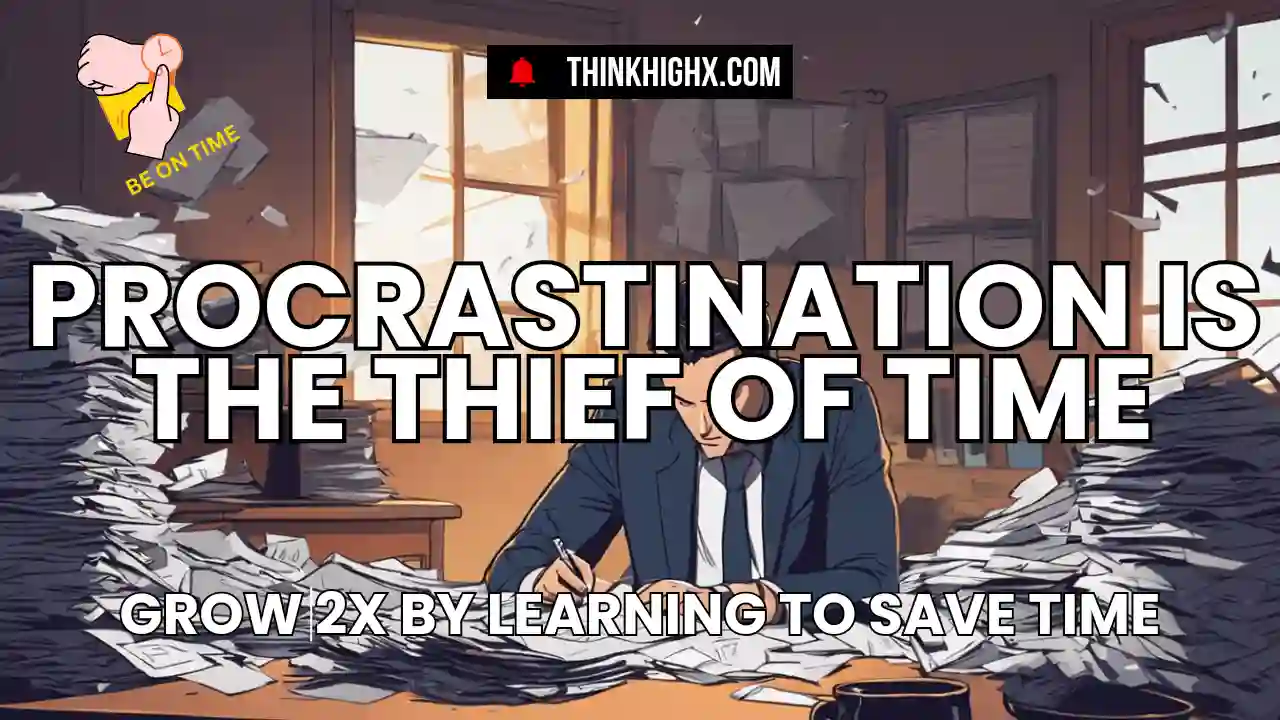Understanding that Procrastination is the Thief of Time

Procrastination is when we delay doing things we need to do. We often think we have plenty of time, but putting tasks off can lead to stress and rushed work. This is why people say, “Procrastination is the thief of time.” Time slips away while we avoid what’s important, making it harder to reach our goals. By understanding procrastination, we can start making better use of our time and feel more in control.
Main Takeaways
- Procrastination leads to wasted time and missed opportunities, ultimately harming productivity and success.
- Understanding the psychology of procrastination is key to breaking the cycle.
- Effective strategies, like time management and mindset shifts, help combat procrastination.
- Overcoming procrastination requires a mix of discipline, planning, and self-awareness.
- Small daily habits and long-term commitment to change are crucial to mastering time.
Table of Contents
1. Introduction: Procrastination is the Thief of Time
What Does “Procrastination is the Thief of Time” Mean?
“Procrastination is the thief of time” is a saying that highlights a powerful truth: when we delay important tasks, we lose valuable time that can never be reclaimed. The phrase itself dates back to the 18th century, attributed to English writer Edward Young, who saw time as a precious resource easily stolen by procrastination. But what does this mean for us today? Procrastination doesn’t just waste time; it takes away opportunities, reduces productivity, and creates a cycle of stress and unfinished tasks.
Procrastination often feels like a small decision, like putting off a project until “later.” However, each delay adds up, and before we realise it, hours, days, or even weeks have slipped by. Have you ever noticed how easy it is to push tasks aside, only to regret it later? Understanding how procrastination steals our time can motivate us to take steps toward reclaiming control over our schedules and goals.
Why Do We Procrastinate?
People procrastinate for many reasons, often without even realising why they’re delaying tasks. The psychology behind procrastination is complex, involving emotional factors like fear of failure, perfectionism, and a natural tendency to avoid discomfort. Studies show that the brain prioritises short-term rewards over long-term benefits, making it easier to scroll on social media than to work on a challenging task.
Procrastination isn’t just about poor time management; it’s a deeper struggle with self-discipline, motivation, and sometimes anxiety. By recognizing the root causes, we can begin to develop strategies that help us overcome these barriers and make the most of our time.
2. The Negative Effects of Procrastination on Productivity
Time Wasted and Lost Opportunities
When we procrastinate, we don’t just lose time—we lose potential. Each task we delay has a ripple effect, pushing back deadlines, reducing productivity, and sometimes resulting in missed opportunities. This habit impacts every aspect of our lives, from career growth to personal fulfilment. For instance, someone who delays preparing for a job interview might miss out on their dream job due to lack of preparation.
The costs of procrastination add up over time. It might start with small tasks, like not organising a workspace, but eventually, these delays can affect larger goals. And as time passes, the stress of unfinished tasks builds up, creating a mental burden that makes it even harder to focus on the work at hand.
Increased Stress and Mental Overload
One of the most immediate effects of procrastination is stress. When tasks pile up, our minds become overwhelmed, leading to a cycle of worry and guilt. Research has shown that chronic procrastination can negatively impact mental health, increasing levels of stress, anxiety, and even symptoms of depression. This mental strain not only reduces our productivity but also affects our overall well-being.
With each delay, stress levels rise, creating a “mental load” that makes it even harder to take action. Over time, this can lead to burnout, decreased job satisfaction, and even affect personal relationships. By recognizing these effects, we gain a clearer understanding of why it’s essential to address procrastination and develop habits that help us manage time effectively.
3. Common Triggers and Causes of Procrastination
Fear of Failure and Perfectionism
One of the most common causes of procrastination is fear of failure. When we’re afraid of not meeting high expectations—whether from others or ourselves—we may avoid tasks altogether. Perfectionism plays a large role here; the need to achieve an “ideal” result can paralyse us, making even simple tasks seem daunting. This fear often drives people to delay projects, convinced that waiting will somehow improve the outcome.
Interestingly, fear and perfectionism create a feedback loop: the more we delay due to fear, the more daunting the task becomes, increasing anxiety and lowering confidence. This cycle keeps us trapped, preventing us from taking meaningful steps forward.
Lack of Motivation or Interest
Motivation can be a tricky element. When we find a task boring or irrelevant, procrastination is a natural response. Studies show that our brains are wired to prioritise tasks with immediate rewards over those with long-term benefits, which is why it’s easier to watch TV than work on a report due in a week.
Lack of interest doesn’t mean we lack discipline; it’s often a signal that we need to find a way to make the task more engaging. For example, breaking down a big project into smaller, manageable parts can make it feel more achievable and less overwhelming. Understanding what triggers procrastination can help us address it with a clearer sense of purpose and motivation.
4. How Procrastination Affects Decision-Making
The Role of Indecision in Delayed Tasks
Procrastination and indecision are closely linked. When faced with multiple choices or uncertain outcomes, people often delay decisions to avoid the potential consequences of choosing “wrong.” This “decision paralysis” is common, especially in situations where each choice comes with different risks or benefits. Unfortunately, waiting for the “right” choice can lead to missed opportunities and lost time.
This indecisiveness can impact both personal and professional life, leading to stalled projects and slow progress. By learning to make decisions more confidently—even if they’re not perfect—we can prevent procrastination from creeping in.
How Avoiding Decisions Reduces Productivity
When we avoid decisions, we end up delaying actions as well. Procrastination essentially creates a domino effect: one delay leads to another, reducing productivity and prolonging completion times. This can be particularly harmful in a work setting, where prompt decision-making often drives progress. In the long term, the habit of avoiding choices can limit career advancement and personal growth.
Understanding that decision-making doesn’t have to be perfect can help break the procrastination cycle. By practising small, low-stakes decisions, we can gradually build the confidence needed to tackle larger, more challenging choices without delay.
5. Recognizing Procrastination Patterns in Daily Life
Identifying Habits That Lead to Procrastination
Procrastination often shows up in our daily habits. Small choices, like repeatedly hitting the snooze button or scrolling through social media instead of working, can become ingrained habits that fuel procrastination. Recognizing these patterns is the first step to breaking the cycle. By identifying the moments when we’re most likely to delay tasks, we can start making conscious changes to our routine.
For instance, if you notice that you tend to procrastinate on work after lunch, you might consider scheduling more engaging tasks during that time to keep energy levels up. Small adjustments to daily habits can prevent procrastination from taking root and stealing valuable time.
Self-Awareness Techniques to Detect Procrastination
Building self-awareness around procrastination can help you understand when and why you delay tasks. One effective technique is to journal or track your activities throughout the day. By noting when you’re productive and when you’re tempted to procrastinate, you’ll gain insights into patterns you may not have noticed before.
Asking yourself questions like, “What am I avoiding right now?” or “How will delaying this task affect me later?” can also bring greater awareness to procrastination tendencies. Over time, these techniques can increase accountability, helping you make more intentional choices about time management.
6. The Psychology Behind Procrastination
Understanding the “Procrastination Cycle”
The procrastination cycle is a repeated pattern where avoiding a task leads to short-term relief but long-term stress and guilt. This cycle is fueled by a psychological process where immediate rewards, like relaxation or distraction, take precedence over long-term goals. The cycle continues as we delay tasks, increasing anxiety and reinforcing the habit of procrastination.
Breaking this cycle requires understanding why we’re drawn to immediate comforts. Once we recognize the underlying thought process, we can begin to reframe our approach and prioritise tasks more effectively, reducing the likelihood of procrastination.
How Dopamine and Rewards Influence Delayed Action
Our brains are wired to seek dopamine, a neurotransmitter associated with pleasure and reward. When we choose to watch a video or scroll through social media instead of working, we experience a quick boost in dopamine, which reinforces procrastination. Over time, this can create a habit loop where we seek instant gratification over delayed rewards.
By being mindful of how dopamine drives behaviour, we can make more deliberate choices that support long-term goals. For example, setting up small rewards after completing tasks can create a positive feedback loop, making it easier to overcome procrastination in favour of productive actions.
7. Proven Time Management Techniques to Combat Procrastination
The Pomodoro Technique for Focused Work
The Pomodoro Technique is a popular method for improving focus and reducing procrastination. By breaking work into 25-minute intervals (or “Pomodoros”) followed by short breaks, this technique leverages the power of short bursts of concentration. Each Pomodoro keeps you engaged, while the scheduled breaks help prevent burnout.
This time management strategy is especially effective for tasks that seem overwhelming, as it encourages steady progress without feeling overwhelming. After four Pomodoros, a longer break allows your brain to recharge, making it easier to tackle more tasks without the urge to procrastinate.
Task Prioritization Methods (Eisenhower Matrix, etc.)
Prioritising tasks can also help reduce procrastination by clarifying what needs immediate attention. The Eisenhower Matrix, which divides tasks into four quadrants based on urgency and importance, is an excellent tool for this. By categorising tasks, you can focus on what truly matters, rather than getting distracted by less critical work.
Setting priorities helps you avoid decision fatigue and reduces the temptation to delay important work. When tasks are clearly defined, it becomes easier to approach them with a sense of purpose, improving both productivity and time management.
8. Building Self-Discipline to Overcome Procrastination
The Role of Routine and Habit-Building
Self-discipline plays a crucial role in overcoming procrastination, and building consistent routines is one of the most effective ways to strengthen it. Routines establish structure in your day, helping you move through tasks with less mental effort. For example, setting aside a specific time each day for focused work can reduce the decision-making around when to start.
By building habits that align with your goals, you gradually reduce the temptation to procrastinate. Over time, these small routines can have a big impact on productivity, making it easier to tackle tasks consistently without unnecessary delays.
Creating Accountability to Stay on Track
Accountability is a powerful motivator when it comes to tackling procrastination. Sharing your goals with someone else, whether a friend, colleague, or coach, can create a sense of responsibility and encourage you to stay committed. Many people find that knowing someone else is checking in on their progress gives them that extra push to follow through.
Whether it’s through a weekly check-in or a simple text update, accountability can help keep you focused and motivated. This approach reduces the likelihood of procrastination, making it easier to stay on track with your tasks and goals.
9. Shifting Mindsets to Beat Procrastination
Reframing Tasks to Make Them Appealing
One effective way to overcome procrastination is by reframing tasks to make them more engaging or appealing. Instead of focusing on the difficulty or length of a task, try to see it as an opportunity for growth or as a challenge to conquer. This mental shift can reduce the resistance we feel, making it easier to dive into the work.
For example, instead of dreading a complex project, view it as a chance to showcase your skills or learn something new. This approach transforms tasks from obligations into opportunities, decreasing the likelihood of procrastination and increasing motivation.
Cultivating a Growth Mindset for Long-Term Success
A growth mindset—a belief in our ability to improve and adapt over time—can help break the habit of procrastination. When we adopt this mindset, we’re more open to tackling challenges and less likely to avoid difficult tasks. This resilience makes it easier to stay committed and engaged, even when the work feels tough.
By focusing on progress rather than perfection, we create a healthier relationship with productivity. This mindset shift not only reduces procrastination but also fosters a more sustainable approach to personal and professional growth.
10. Setting Realistic Goals to Avoid Overwhelm
How Goal Setting Reduces Procrastination
Setting clear and achievable goals is crucial to avoiding overwhelm, a common cause of procrastination. When goals are specific, measurable, and realistic, they provide a clear roadmap, reducing uncertainty and making it easier to get started. Instead of focusing on a large, intimidating outcome, break down your goals into smaller, manageable steps.
For instance, rather than aiming to “finish a report,” set a goal to complete the introduction or outline first. This approach reduces the mental barrier to starting and allows you to build momentum, step by step, without feeling overwhelmed.
Breaking Down Large Tasks into Manageable Steps
Big tasks can feel daunting, leading to procrastination as we wait for the “perfect time” to start. By breaking down large projects into smaller, actionable steps, we create a series of mini-goals that are easier to tackle. This method not only reduces anxiety but also provides a sense of accomplishment with each step completed.
For example, if you’re writing a lengthy article, begin with a small task like outlining main points. Each completed section builds confidence, gradually leading to the final goal. This step-by-step approach is a powerful way to manage time effectively and reduce procrastination.
11. Practical Tips and Tools for Staying on Schedule
Apps and Tools to Help You Manage Time
In today’s digital age, there are numerous tools designed to help you manage time and stay on schedule. Apps like Trello, Todoist, and RescueTime can aid in organising tasks, tracking productivity, and managing daily goals. Trello, for instance, allows you to visually map out projects, while Todoist helps you create detailed task lists that keep you on track.
RescueTime goes a step further by tracking how you spend your time online, offering insights into habits and helping you identify where you may be losing valuable hours. By using these tools effectively, you can maintain focus and ensure that procrastination doesn’t interfere with your priorities.
Productivity Techniques to Keep on Track
Aside from digital tools, specific productivity techniques can help combat procrastination. Techniques like “time blocking,” where you set aside dedicated blocks of time for specific tasks, can improve focus and prevent distractions. Additionally, setting deadlines for yourself—even if they’re self-imposed—creates a sense of urgency, motivating you to complete tasks on schedule.
Another useful technique is the “two-minute rule”: if a task will take two minutes or less to complete, do it immediately instead of putting it off. This simple rule can reduce procrastination by tackling small tasks before they accumulate and become overwhelming.
12. Conclusion: Embracing Consistency and Progress
Building Lasting Habits for Time Mastery
Overcoming procrastination isn’t just about quick fixes; it’s about creating sustainable habits that prioritise consistency. Developing a daily routine and committing to small, steady progress helps prevent the urge to delay tasks. By mastering these habits, you gain control over your time and gradually reduce procrastination’s hold on your life.
For example, setting aside 10 minutes each morning to plan your day can create a foundation for consistent productivity. These small actions, repeated over time, build momentum and encourage a proactive approach to work and personal goals.
Celebrating Small Wins to Reinforce Positive Behaviour
Acknowledge your achievements, no matter how small, as this reinforces positive behaviour and motivation. Celebrating small wins, like completing a challenging task or meeting a self-imposed deadline, creates a positive feedback loop that encourages continued progress. This approach not only makes the journey more rewarding but also strengthens your resolve to maintain a productive mindset.
By focusing on these small victories, you build confidence and reinforce productive habits, making it easier to overcome procrastination and stay committed to your goals.
FAQs (Frequently Asked Questions)
Why is procrastination called the thief of time?
Procrastination is called the thief of time because it makes people delay tasks. When people wait to do something, they lose time. This lost time cannot come back. Instead of finishing tasks, people waste time on other things. This is why procrastination is like a thief that takes away our valuable time.
Who first said procrastination is the thief of time?
The saying “procrastination is the thief of time” is from Edward Young. He was an English writer. Edward said this a long time ago in the 18th century. He wanted to show how important time is and how delaying tasks takes away our time. This idea is still true today for many people.
Why is procrastination a waste of time?
Procrastination is a waste of time because it stops us from doing important tasks. When we delay work, we do not finish what we need to do. This can lead to stress and problems later. Instead of being productive, we waste hours doing less important things. This makes it hard to achieve our goals.
Why is procrastination wrong?
Procrastination is wrong because it can hurt our lives. When we delay tasks, we do not learn or grow. It can lead to stress, missed deadlines, and lost opportunities. This bad habit makes us feel guilty and unhappy. It is better to do tasks on time. This helps us feel good and be successful.
How to stop procrastination?
To stop procrastination, we can use some simple steps. First, we should set small goals. This makes tasks feel easier. Second, we can make a daily plan to organise our time. Third, we should remove distractions like phones or TV. Finally, we can reward ourselves when we finish tasks. This helps us stay motivated.
Is procrastination a big issue?
Yes, procrastination is a big issue for many people. It affects students, workers, and anyone with tasks to do. When people delay work, it can lead to stress and failure. They might miss deadlines or not do well in school or work. This habit can create problems in life, so it is important to address it.
How does procrastination affect us?
Procrastination affects us in many ways. It can cause stress and anxiety because we worry about unfinished tasks. This habit makes us feel guilty for not doing what we should. It can also lead to low self-esteem, as we do not achieve our goals. Overall, procrastination can hurt our happiness and success in life.
Why should we avoid procrastination?
We should avoid procrastination because it helps us be more productive. When we do tasks on time, we feel less stress and more satisfaction. Avoiding procrastination also helps us reach our goals faster. It allows us to enjoy our free time without worry. Overall, being proactive leads to a happier and more successful life.
What is the 2-minute rule?
The 2-minute rule is a simple way to stop procrastination. It says that if a task takes two minutes or less, we should do it right away. For example, if we need to answer an email or wash a dish, we do it immediately. This rule helps us finish small tasks quickly and keeps our day organised.


